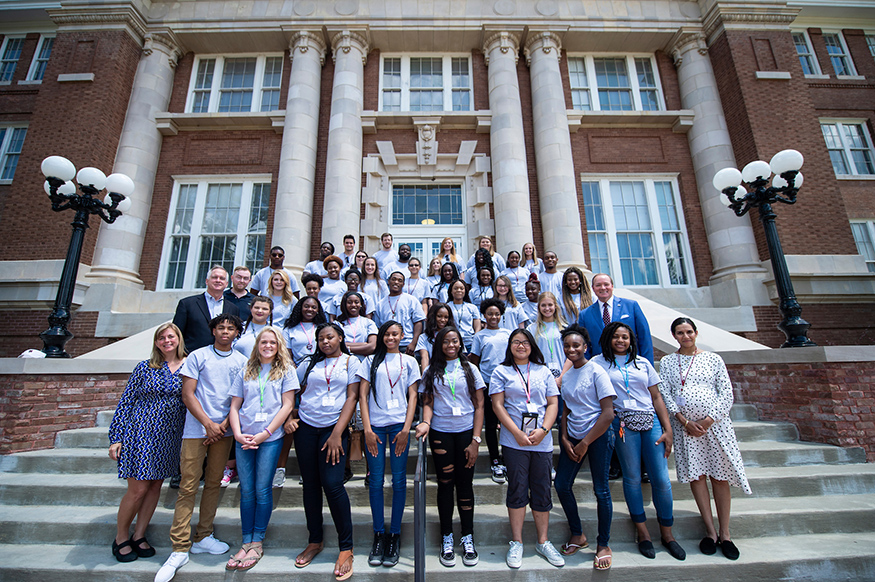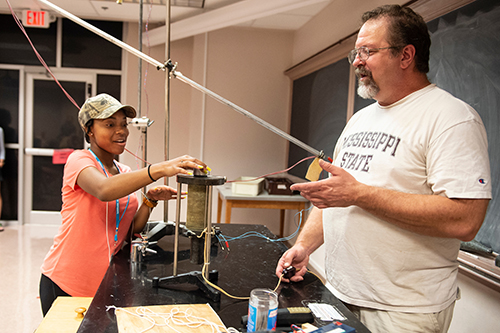MSU hosts physics academy as high school students prepare for innovative Advanced Placement course

Contact: James Carskadon
STARKVILLE, Miss.—For the second consecutive year, Mississippi State University is helping promising high school students from rural school districts prepare to take an innovative Advanced Placement physics course.

From July 16-27, MSU, together with the Global Teaching Project and the Mississippi Public School Consortium for Educational Access, is hosting an AP physics preparatory academy for over 30 students. The summer academy is part of a three-year pilot program designed to bring Advanced Placement courses, beginning with physics, to rural and low-income school districts where many high schools offer very few, if any, AP courses.
Once students begin the school year in their respective districts, they will take AP physics taught in a “blended” format. In-class teachers will implement lesson plans prepared by experienced AP educators. Meg Urry, a renowned Yale physicist, will again serve as lead instructor, teaching students directly through asynchronous video. They also receive tutoring and mentorship through regular videoconferences with college physics majors at prominent universities around the country. During the spring semester, students prepare further for the AP exam through a residential program at the University of Mississippi.
The first year of the pilot program saw approximately 50 students from 10 participating high schools take the AP physics 1 exam. In nine of those schools, they were the first in the history of their schools to do so, said Global Teaching Project CEO Matt Dolan. More students and school districts are expected to participate this year, as students from the MSU summer program will be joined by others at their schools once the academic year begins.
“We seek to provide promising high school students, regardless of circumstances, access to the advanced courses they need to achieve their potential,” Dolan said. “We are entering only our second year, but we are heartened by our progress through the collaborative efforts of our students and schools with Mississippi State and Ole Miss, as well as faculty, alumni, and current students from Yale, Virginia, Stanford, and Clemson.”
There is no charge to students, schools or districts to participate in the program, which is made possible by private donors, including the Jack Kent Cooke Foundation.
Students in the free summer program at MSU were selected by the participating school districts, which include Aberdeen, Booneville, Coahoma AHS, Holmes County, Lauderdale County, Quitman County and Scott County. Teachers from Pontotoc County, Houston and Starkville school districts also participated.
Lizzie Brandon is serving as the academy’s coordinator on MSU’s campus. In addition to physics instruction, students toured MSU facilities such as the Center for Advanced Vehicular Systems, known as CAVS, and the High Voltage Laboratory. Students also spend two weeks getting a glimpse of life on a college campus by receiving college-level lessons, meals in campus dining halls and access to university recreation facilities. They also learned about scholarship opportunities and met with MSU President Mark E. Keenum.
“They not only learn physics here, but they get to learn about avenues for college, as well,” said Brandon, a recent MSU secondary education graduate and science teacher at Starkville High School. “They get to go to all these different places at Mississippi State where they can see what all you can do with physics. What they saw at CAVS all starts with a basis in physics.”
During their time at MSU, students were introduced to Urry with a videoconference lesson on black holes and other astrophysics phenomena.
“I don’t think you can go wrong studying physics,” Urry told the students. “Whatever you learn will be useful, no matter what you do. It’s all about problem solving.”
Both the Global Teaching Project and the Mississippi Public School Consortium for Educational Access are hoping to scale and grow their efforts, including increasing the number of AP courses offered, which would continue to enhance educational opportunities for Mississippi students.
According to the College Board, which runs the Advanced Placement program, approximately 85 percent of selective colleges report that a student’s AP experience favorably impacts admissions decisions, and millions of students have had the opportunity to graduate from college more quickly and at significantly lower costs because of colleges and universities awarding credit for AP scores.
For more on the Global Teaching Project, visit www.globalteachingproject.com.
The Mississippi Public School Consortium for Educational Access can be found at www.educationaccessms.org.
MSU is Mississippi’s leading university, available online at www.msstate.edu.